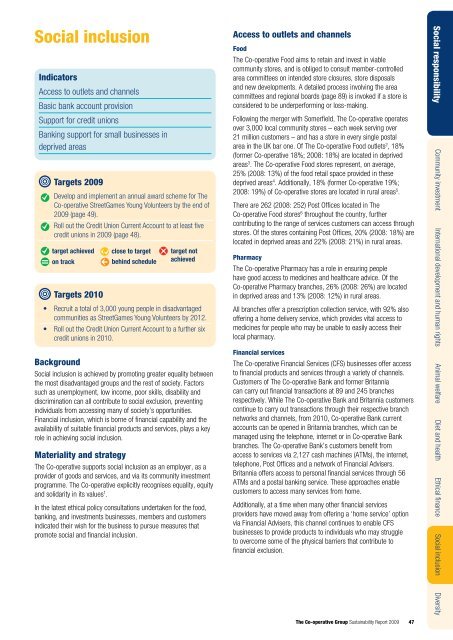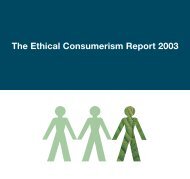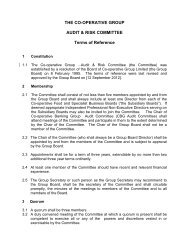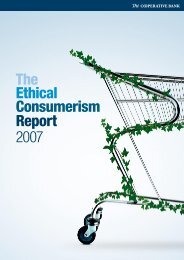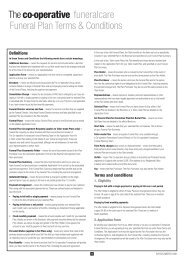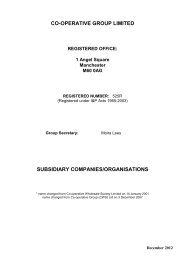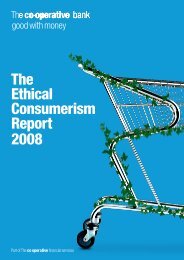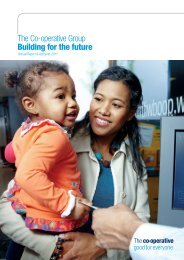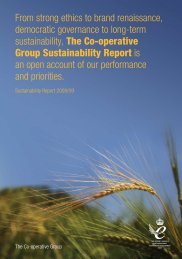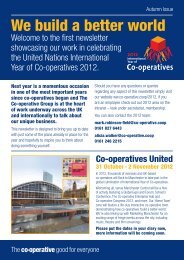Sustainability Report 2009 - The Co-operative
Sustainability Report 2009 - The Co-operative
Sustainability Report 2009 - The Co-operative
You also want an ePaper? Increase the reach of your titles
YUMPU automatically turns print PDFs into web optimized ePapers that Google loves.
Social inclusion<br />
Indicators<br />
Access to outlets and channels<br />
Basic bank account provision<br />
Support for credit unions<br />
Banking support for small businesses in<br />
deprived areas<br />
Targets <strong>2009</strong><br />
Develop and implement an annual award scheme for <strong>The</strong><br />
<strong>Co</strong>-<strong>operative</strong> StreetGames Young Volunteers by the end of<br />
<strong>2009</strong> (page 49).<br />
Roll out the Credit Union Current Account to at least five<br />
credit unions in <strong>2009</strong> (page 48).<br />
target achieved<br />
on track<br />
Targets 2010<br />
close to target<br />
behind schedule<br />
target not<br />
achieved<br />
• Recruit a total of 3,000 young people in disadvantaged<br />
communities as StreetGames Young Volunteers by 2012.<br />
• Roll out the Credit Union Current Account to a further six<br />
credit unions in 2010.<br />
Background<br />
Social inclusion is achieved by promoting greater equality between<br />
the most disadvantaged groups and the rest of society. Factors<br />
such as unemployment, low income, poor skills, disability and<br />
discrimination can all contribute to social exclusion, preventing<br />
individuals from accessing many of society’s opportunities.<br />
Financial inclusion, which is borne of financial capability and the<br />
availability of suitable financial products and services, plays a key<br />
role in achieving social inclusion.<br />
Materiality and strategy<br />
<strong>The</strong> <strong>Co</strong>-<strong>operative</strong> supports social inclusion as an employer, as a<br />
provider of goods and services, and via its community investment<br />
programme. <strong>The</strong> <strong>Co</strong>-<strong>operative</strong> explicitly recognises equality, equity<br />
and solidarity in its values 1 .<br />
In the latest ethical policy consultations undertaken for the food,<br />
banking, and investments businesses, members and customers<br />
indicated their wish for the business to pursue measures that<br />
promote social and financial inclusion.<br />
Access to outlets and channels<br />
Food<br />
<strong>The</strong> <strong>Co</strong>-<strong>operative</strong> Food aims to retain and invest in viable<br />
community stores, and is obliged to consult member-controlled<br />
area committees on intended store closures, store disposals<br />
and new developments. A detailed process involving the area<br />
committees and regional boards (page 89) is invoked if a store is<br />
considered to be underperforming or loss-making.<br />
Following the merger with Somerfield, <strong>The</strong> <strong>Co</strong>-<strong>operative</strong> operates<br />
over 3,000 local community stores – each week serving over<br />
21 million customers – and has a store in every single postal<br />
area in the UK bar one. Of <strong>The</strong> <strong>Co</strong>-<strong>operative</strong> Food outlets 2 , 18%<br />
(former <strong>Co</strong>-<strong>operative</strong> 18%; 2008: 18%) are located in deprived<br />
areas 3 . <strong>The</strong> <strong>Co</strong>-<strong>operative</strong> Food stores represent, on average,<br />
25% (2008: 13%) of the food retail space provided in these<br />
deprived areas 4 . Additionally, 18% (former <strong>Co</strong>-<strong>operative</strong> 19%;<br />
2008: 19%) of <strong>Co</strong>-<strong>operative</strong> stores are located in rural areas 5 .<br />
<strong>The</strong>re are 262 (2008: 252) Post Offices located in <strong>The</strong><br />
<strong>Co</strong>-<strong>operative</strong> Food stores 6 throughout the country, further<br />
contributing to the range of services customers can access through<br />
stores. Of the stores containing Post Offices, 20% (2008: 18%) are<br />
located in deprived areas and 22% (2008: 21%) in rural areas.<br />
Pharmacy<br />
<strong>The</strong> <strong>Co</strong>-<strong>operative</strong> Pharmacy has a role in ensuring people<br />
have good access to medicines and healthcare advice. Of the<br />
<strong>Co</strong>-<strong>operative</strong> Pharmacy branches, 26% (2008: 26%) are located<br />
in deprived areas and 13% (2008: 12%) in rural areas.<br />
All branches offer a prescription collection service, with 92% also<br />
offering a home delivery service, which provides vital access to<br />
medicines for people who may be unable to easily access their<br />
local pharmacy.<br />
Financial services<br />
<strong>The</strong> <strong>Co</strong>-<strong>operative</strong> Financial Services (CFS) businesses offer access<br />
to financial products and services through a variety of channels.<br />
Customers of <strong>The</strong> <strong>Co</strong>-<strong>operative</strong> Bank and former Britannia<br />
can carry out financial transactions at 89 and 245 branches<br />
respectively. While <strong>The</strong> <strong>Co</strong>-<strong>operative</strong> Bank and Britannia customers<br />
continue to carry out transactions through their respective branch<br />
networks and channels, from 2010, <strong>Co</strong>-<strong>operative</strong> Bank current<br />
accounts can be opened in Britannia branches, which can be<br />
managed using the telephone, internet or in <strong>Co</strong>-<strong>operative</strong> Bank<br />
branches. <strong>The</strong> <strong>Co</strong>-<strong>operative</strong> Bank’s customers benefit from<br />
access to services via 2,127 cash machines (ATMs), the internet,<br />
telephone, Post Offices and a network of Financial Advisers.<br />
Britannia offers access to personal financial services through 56<br />
ATMs and a postal banking service. <strong>The</strong>se approaches enable<br />
customers to access many services from home.<br />
Additionally, at a time when many other financial services<br />
providers have moved away from offering a ‘home service’ option<br />
via Financial Advisers, this channel continues to enable CFS<br />
businesses to provide products to individuals who may struggle<br />
to overcome some of the physical barriers that contribute to<br />
financial exclusion.<br />
Social responsibility <strong>Co</strong>mmunity investment International development and human rights Animal welfare Diet and health Ethical finance Social inclusion Diversity<br />
<strong>The</strong> <strong>Co</strong>-<strong>operative</strong> Group <strong>Sustainability</strong> <strong>Report</strong> <strong>2009</strong> 47


